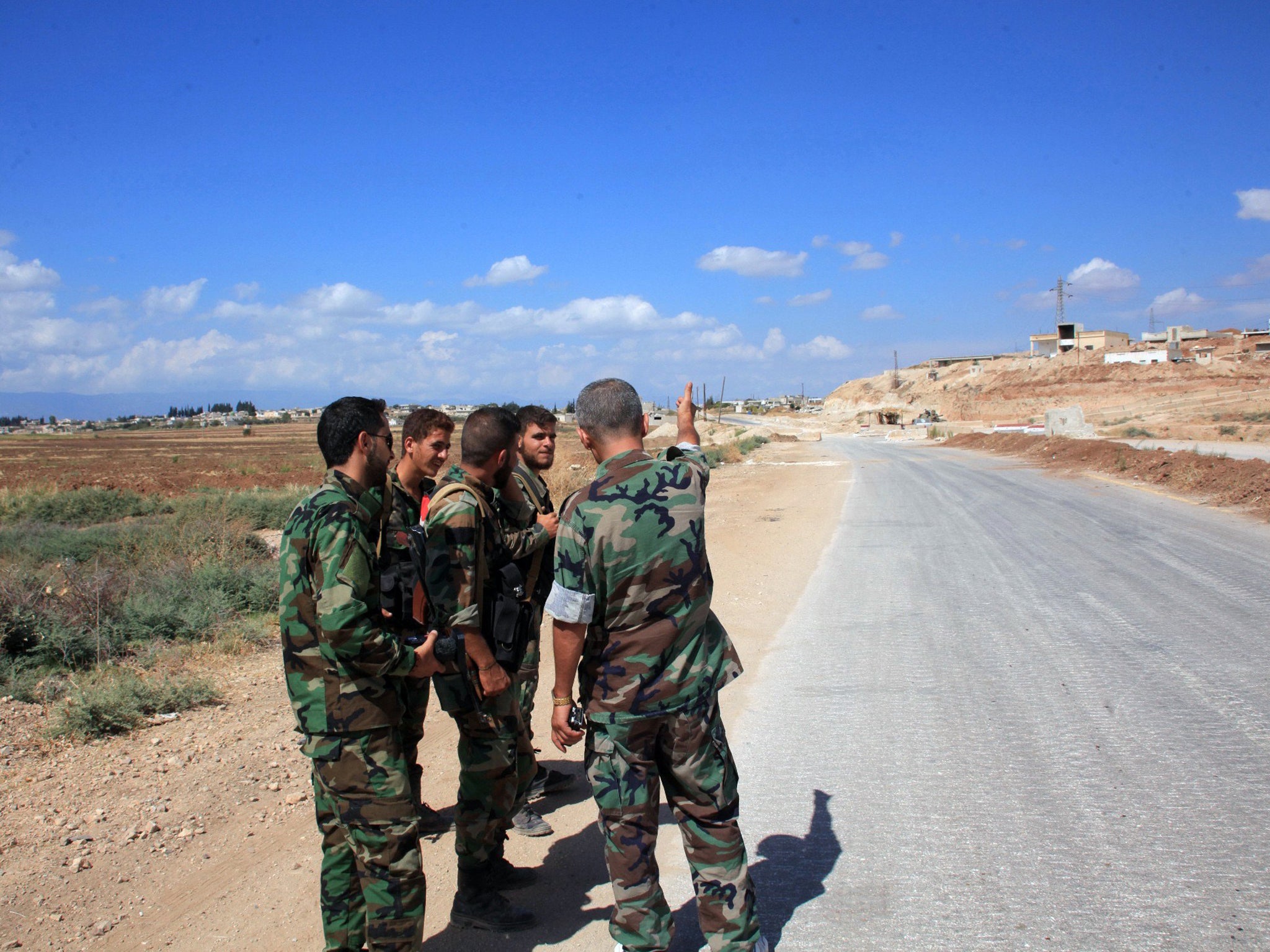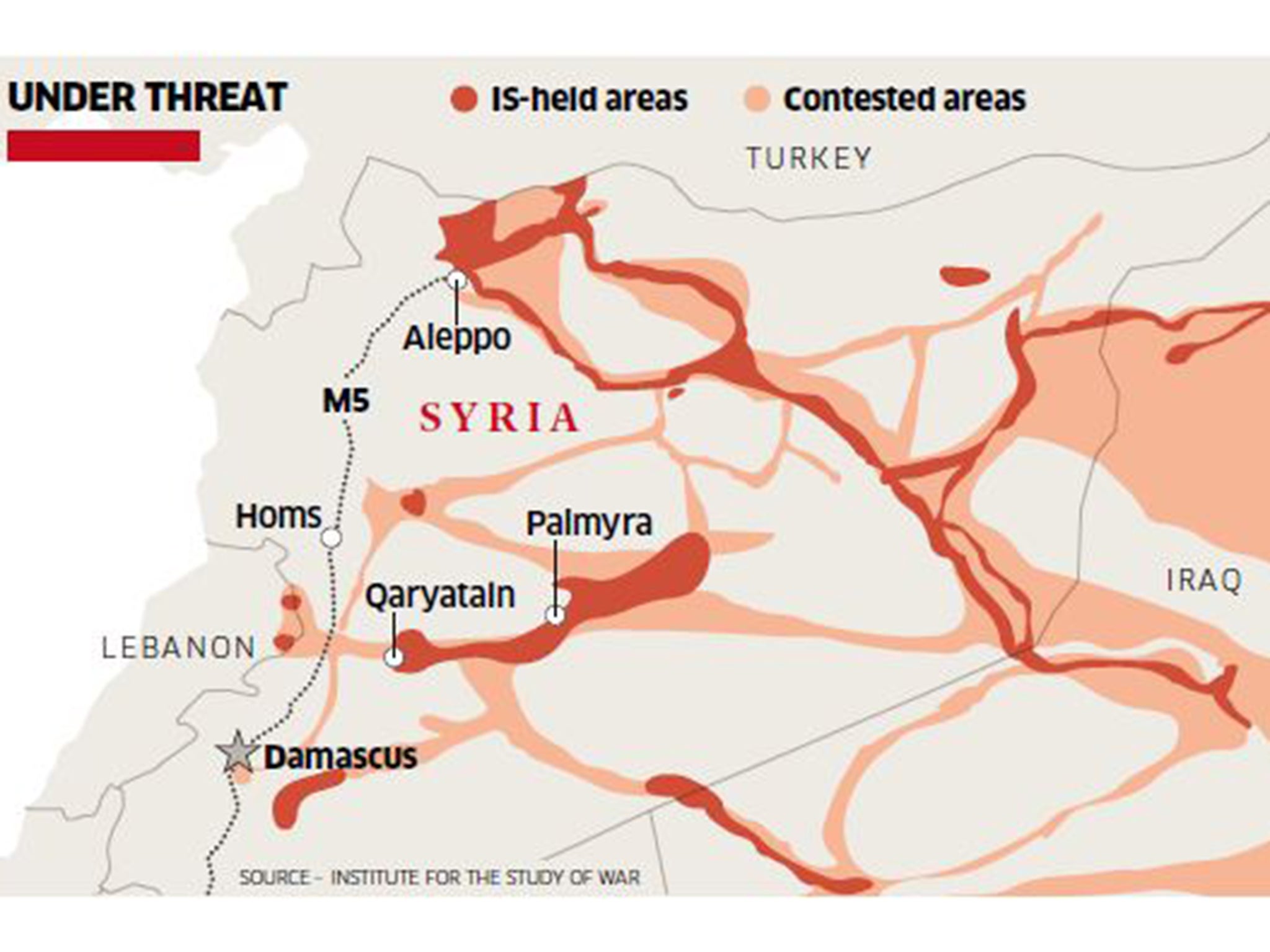Isis are threatening to capture a vital highway in Syria - the loss of which could push millions of refugees out of government-held areas
Though the Assad regime may not be about to collapse, any sign that it is weakening could convince millions of Syrians that it is time to leave the country


Your support helps us to tell the story
From reproductive rights to climate change to Big Tech, The Independent is on the ground when the story is developing. Whether it's investigating the financials of Elon Musk's pro-Trump PAC or producing our latest documentary, 'The A Word', which shines a light on the American women fighting for reproductive rights, we know how important it is to parse out the facts from the messaging.
At such a critical moment in US history, we need reporters on the ground. Your donation allows us to keep sending journalists to speak to both sides of the story.
The Independent is trusted by Americans across the entire political spectrum. And unlike many other quality news outlets, we choose not to lock Americans out of our reporting and analysis with paywalls. We believe quality journalism should be available to everyone, paid for by those who can afford it.
Your support makes all the difference.Islamic State (Isis) forces in Syria are threatening to capture a crucial road, the loss of which could touch off a panic and the exodus of several million refugees from government areas, in addition to the four million who have already fled. Isis fighters have advanced recently to within 22 miles of the M5 highway, the only major route connecting government-held territory in Damascus to the north and west of the country.
The beginnings of the latest crisis for the government of President Bashar al-Assad came with the capture by Isis on 6 August of the strategically placed, largely Christian town of al-Qaryatain, north-east of Damascus. Since then, Islamist units have advanced further west, capturing two villages closer to the M5. The Syrian Army has so far failed to retake Qaryatain, where Isis has demolished the St Elian monastery, parts of which were 1,500 years old.
The four million Syrians who are already refugees mostly came from opposition or contested areas that have been systematically bombarded by government aircraft and artillery, making them uninhabitable. But the majority of the 17 million Syrians still in the country live in government-controlled areas now threatened by Isis. These people are terrified of Isis occupying their cities, towns and villages because of its reputation for mass executions, ritual mutilation and rape against those not obedient to its extreme variant of Sunni Islam.
Half the Syrian population has already been displaced inside or outside the country, so accurate figures are hard to estimate, but among those particularly at risk are the Alawites (2.6 million), the Shia heterodox sect that has provided the ruling elite of Syria since the 1960s, the Christians (two million), the Syrian Kurds (2.2 million), and Druze (650,000) in addition to millions of Sunni Arabs associated with the Syrian government and its army. The forced flight of these communities could swiftly double the total number of refugees to eight million.

Government forces are showing signs of being fought out after four years of war and have recently suffered a series of defeats at the hands of Isis, which captured Palmyra in May, and by a coalition led by the al-Qaeda affiliate, Jabhat al-Nusra, which took Idlib city in March. But it would be a far more serious defeat for President Assad if Isis cuts the M5, which is seen as “the spinal column of the regime”. The government has never lost control of it for an extended period, though the road has been closed to civilian traffic by snipers hiding in the ruins of north Damascus, where whole districts have been blown up or bulldozed by the government. On two occasions, Nusra fighters seized the ancient Christian village of Maaloula, just off the M5, forcing inhabitants to escape to Damascus.
Governments and people in the EU have had to pay horrified attention to the plight of refugees in the past few days because of pictures of the drowned body of Aylan al-Kurdi. But there is scant attention to the deteriorating security situation in Syria that could produce millions more migrants fleeing for their lives.
The UNHCR says that Syria has “become the world’s top source country of refugees, overtaking Afghanistan, which had held this position for more than three decades”. Out of every four new refugees in the world today, one will be a Syrian. Commenting on this exodus, and the likelihood that it will be exacerbated if Isis cuts the M5 highway, the online humanitarian news and analysis publication, IRIN, says that “Europe’s current migration crisis is essentially the arrival of the Syrian crisis on European shores.”
Unfortunately, European concern about ending the refugee crisis has not energised efforts to end the war in Syria which shows every sign of getting worse. Assad’s forces are getting weaker and he admits to a shortage of troops, but territory lost by him is usually occupied by Isis, Jabhat al-Nusra or Ahrar al-Sham, all Salafi-jihadi movements with the same violent and intolerant ideology.
Even former advocates of the “moderate” Syrian rebels, say that today the armed opposition is dominated by extreme fundamentalists. Their dominance makes it impossible to create any power-sharing government in Damascus that would be key to ending the war.
The Damascus government and its army are unlikely to implode as happened in Libya or northern Iraq, but people in government areas are understandably frightened by recent military reverses. Many argue that they and their families should get out while they can. Living in government areas does not always mean that they are in favour of Assad remaining in power, but they fear that the alternative to the present regime will be far worse. Isis deliberately foments terror by showing videos of its atrocities to create panic among soldiers and civilians, and there is also the knowledge that the Syrian Army will bombard any place from which it retreats.
David Cameron said last week: “We think that the most important thing is to try to bring peace and stability to that part of the world.” But in practice, Britain, the US, Gulf monarchies and Turkey have exacerbated the Syrian conflict by supporting an armed opposition that from an early stage was led by extreme jihadis. As early as August 2012 a Defense Intelligence Agency report states that “the Salafist, the Muslim Brotherhood, and AQI [Al- Qaeda in Iraq] are the major forces driving the insurgency in Syria.”
Likely British participation in the US-led air campaign against Isis in Syria will make little difference unless it is directed against Isis when it is attacking the Syrian Army and is co-ordinated with its ground forces. These tactics worked effectively when the US collaborated with the Syrian Kurdish YPG militia to win battles at Kobani and Hassakah, but the US is so far opposed to doing anything that will be seen as helping the Assad government. A price for such aid might be an insistence that the Syrian air force stop barrel bombing civilian areas.
Surprisingly, even the fall of Mosul in Iraq to Isis in the summer of 2014 and the seizure of more than half of Syria by Isis over the past year, has not prevented US and European leaders underestimating Isis. They have claimed that it is past its peak, wishful thinking that should have been deflated in May when Isis took Ramadi, the capital of Anbar province in Iraq, and Palmyra in Syria five days later. So far neither the Syrian nor the Iraqi armies have launched counter-attacks capable of retaking either city.
The Assad government will not necessarily collapse overnight, but any sign that it is weakening will convince millions of Syrians that it is time to leave the country. Despite the deepening refugee crisis brought about by the continuing civil war in Syria, governments in Britain, the US, France and elsewhere are doing little to help end it. Half the Syrian people have already been displaced from their homes and millions more may soon be desperately trying to flee their country. The Syrian war and European refugee crisis are part and parcel of the same thing.
Join our commenting forum
Join thought-provoking conversations, follow other Independent readers and see their replies
Comments